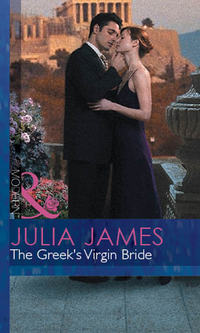
Полная версия
The Italian's Rags-To-Riches Wife


At Harlequin Presents we are always interested in what you, the readers, think about the series. So if you have any thoughts you’d like to share, please join in the discussion of your favorite books at www.iheartpresents.com—created by and for fans of Harlequin Presents!
On the site, by authors and fans, the inside scoop from editors and links to authors and books. Enjoy and share with others the unique world of Presents—we’d love to hear from you!
MILLS & BOON
Before you start reading, why not sign up?
Thank you for downloading this Mills & Boon book. If you want to hear about exclusive discounts, special offers and competitions, sign up to our email newsletter today!
SIGN ME UP!
Or simply visit
signup.millsandboon.co.uk
Mills & Boon emails are completely free to receive and you can unsubscribe at any time via the link in any email we send you.

He’s got her firmly in his sights and she’s got only one chance of survival—surrender to his blackmail…and him…in his bed!
Bedded by…Blackmail
The big miniseries from Harlequin Presents®.
Dare you read it?
Julia James
THE ITALIAN’S RAGS-TO-RICHES WIFE


TORONTO • NEW YORK • LONDON
AMSTERDAM • PARIS • SYDNEY • HAMBURG
STOCKHOLM • ATHENS • TOKYO • MILAN • MADRID
PRAGUE • WARSAW • BUDAPEST • AUCKLAND
All about the author…
Julia James
JULIA JAMES lives in England with her family. Harlequin® novels were the first “grown-up” books she read as a teenager, alongside Georgette Heyer and Daphne du Maurier, and she’s been reading them ever since. Julia adores the British countryside—in all its seasons—and is fascinated by all things historical, from castles to cottages. She also has a special love for the Mediterranean—“the most perfect landscape after England!” She considers both ideal settings for romance stories. Since becoming a romance writer, she has, she says, had the great good fortune to start discovering the Caribbean, as well, and is happy to report that those magical, beautiful islands are also ideal settings for romance stories. “One of the best things about writing romance is that it gives you a great excuse to take holidays in fabulous places,” says Julia, “all in the name of research, of course!”
Her first stab at novel writing was Regency romances. “But, alas, no one wanted to publish them,” she says. She put her writing aside until her family commitments were clear, and then renewed her love affair with contemporary romances. “My writing partner and I made a pact not to give up until we were published—and we both succeeded! Natasha Oakley writes for Harlequin Romance®, and we faithfully read each other’s works in progress and give each other a lot of free advice and encouragement.”
In between writing Julia enjoys walking, gardening, needlework, baking “extremely gooey chocolate cakes” and trying to stay fit!
CONTENTS
PROLOGUE
CHAPTER ONE
CHAPTER TWO
CHAPTER THREE
CHAPTER FOUR
CHAPTER FIVE
CHAPTER SIX
CHAPTER SEVEN
CHAPTER EIGHT
CHAPTER NINE
CHAPTER TEN
CHAPTER ELEVEN
CHAPTER TWELVE
CHAPTER THIRTEEN
CHAPTER FOURTEEN
CHAPTER FIFTEEN
EPILOGUE
PROLOGUE
‘WHAT do you mean, you’re retaining the chairmanship?’
The voice that had spoken was harsh, and clearly angry. But out of respect for the man he had addressed, a man more than twice his age, Allesandro di Vincenzo kept the anger under control.
‘The situation has changed,’ the other man replied sombrely. He was sitting in his leather chair, in the library of his eighteenth-century villa in the depths of the Roman countryside.
Allesandro drew in his breath sharply. His lithe body was clad in a handmade suit from one of Italy’s most stylish and fashionable designers, and his sable feathered hair was superbly cut, setting off a face whose features could have graced an Italian movie star, let alone the chief executive of a major Italian company. He had dark, long-lashed eyes, high cheekbones, a finely cut nose, planed jaw and a sculpted, mobile mouth which, at the moment, was drawn in a taut, forbidding line.
‘But it’s been understood you would step down in my favour—’
‘Only by you, Allesandro,’ the older man retorted. ‘I never gave any legally binding undertaking. You simply assumed that when Stefano died—’ His voice broke off a moment, then he recovered, and continued. ‘And, as I have said, the situation has changed. Changed in a way I could never have envisaged.’
For a moment the sombre look left him, and he shook his head, looking suddenly every one of his seventy years.
‘I could have had no idea—none at all…’ His voice trailed off.
Allesandro’s brows drew together impatiently. His long-fingered hands pushed back his jacket, indenting around his lean hips.
‘What is this, Tomaso? No idea about what?’
The old man looked at him again. He paused a moment before speaking, his voice heavy.
‘Stefano hid it from me completely. I discovered it now, only when I was able to face going through his personal effects. What I found shocked me to the core.’ He paused again, as if collecting himself, then continued, still in the same heavy voice.
‘The letters are over twenty-five years old—why he kept them I do not know. It cannot have been sentimental attachment, for the last of them says that it will be the final letter—that the writer accepts, finally, that Stefano will not reply. But for whatever reason they survived. And the fact that they did—’ his gaze rested unreadably on the younger man again ‘—changes everything.’
Allesandro’s expression was closed.
‘How so?’ he prompted. There was wariness in his voice, and suspicion. The old man was being evasive, and Allesandro was running out of patience. Ever since Tomaso’s forty-five-year-old son, Stefano, doggedly bachelor, had smashed himself up in his power-boat ten months ago, Allesandro had been earmarked to move up from being the energetic and highly successful chief executive of the company founded by his late father and Tomaso Viale to being chairman of Viale-Vincenzo—with full control. He had given Tomaso time to mourn—even though his relations with his son had never been good—and had even accepted Tomaso taking on the temporary role of caretaker chairman after the initial shock of Stefano’s death.
But enough was enough. Tomaso had given Allesandro every reason to expect that he would retire before the end of the financial year and hand full control of the company over to him. Frustration bit at Allesandro. He had places to be, things to do, plans to execute—and having to make the journey here had not been on his agenda. Dio, he could think of a dozen places he’d rather be right now. Starting with the Rome apartment of Delia Dellatore, whose voluptuous charms were currently exclusively reserved solely for his enjoyment.
He threw a covertly assessing look at Tomaso and saw that he had aged since Stefano’s death. Stefano might not have been a satisfactory son—his flamboyant playboy lifestyle had been wild and self-indulgent—but his death had been a devastating shock.
And now it seemed Tomaso had suffered yet another shock—sufficient enough to distract him from the business of the chairmanship of Viale-Vincenzo.
‘How so, Tomaso?’ Allesandro prompted again. Whatever it was that was keeping the chairmanship out of his reach, he wanted it sorted.
Tomaso’s eyes had a strange expression as he looked at Allesandro before speaking.
‘As you know, Stefano refused to marry, preferring his wild lifestyle.’ There was a familiar disapproval in Tomaso’s voice. ‘So I had little hope of the continuation of my line. But those letters I found were from a woman. A young Englishwoman imploring Stefano to come to her, to at least acknowledge her letters. And her reason for writing them…’
He paused again, and Allesandro saw emotion in the lined face.
‘She bore Stefano a child. A daughter. My granddaughter.’ His hands tightened over the cusp of the arms of the leather chair. He looked straight at the younger man.
‘I want you to find her and bring her here to me, Allesandro.’
CHAPTER ONE
LAURA braced her shoulders and lifted the handles of the overladen wheelbarrow. The tower of damp kindling she had gathered wobbled a moment, but did not fall. Blinking the rain from her eyelashes, she set off over the bumpy ground of the orchard towards the gate that led into the back yard. Her rubber boots swished through the long, wet grass, and her worn corduroy trousers were damp, as was her baggy jacket and hood, but it didn’t bother her. She was used to the rain. It rained a lot in the West Country. Gaining the Tarmacked surface of the back yard made her progress easier, and she headed for the woodshed. Firewood was valuable, and helped cut down on expensive oil and electricity bills.
She needed to save every penny she could.
Not just for the essential repairs to the house which, even when her grandparents had been alive, had become increasingly neglected due to shortage of cash, but also, now that she had inherited Wharton, to pay off the death duties that the taxman had imposed on her.
Anxiety bit at her. Even as her head told her that selling Wharton was the most sensible course of action, her heart rebelled vehemently. She couldn’t just sell it like a pair of old shoes!
It was the only home she could remember—her haven from the world. She had been brought up in its sheltering protection by her grandparents after the sorry and shameful tragedy that had befallen their only daughter. A daughter who had died, unmarried, and left behind an illegitimate baby…with a father who had refused to acknowledge her.
But there was no income to go with Wharton. Laura’s only hope of keeping it was to convert it to an upmarket holiday let—but that required a new kitchen, en suite bathrooms, extensive repairs and redecorating. All far too expensive.
Worse, the first tranche of tax was due imminently, and her only means of paying it was by selling the last few paintings and antiques she had in the house. Laura hated the idea of selling them, but was faced with no other option.
Anxiety pressed her again, a constant companion.
As she emptied her barrowload of kindling into the woodshed to dry off, and set off back towards the orchard to gather yet more, she halted suddenly. A car was approaching down the long drive from the road.
Few people ever called. Her grandparents had kept themselves very much to themselves, and Laura did likewise. As she listened, she heard the car take the fork to the seldom-used front drive. Abandoning the wheelbarrow, she set off around the side of the house.
A gleaming silver saloon car was pulled up outside the front door, its sides flecked with mud but still looking as sleek and expensive and as out of place as if it had been a spaceship.
And looking even more out of place was the man who was getting out of it.
Laura’s mouth fell open, and she stared gormlessly, blinking in the rain.
Allesandro stepped out of the car, his expression taut, barely suppressing his black mood. Even with SatNav the narrow, winding lanes had been almost impossible to navigate. And now that he was finally here the place seemed deserted. The stone surface of the old house was as damp and sodden as the landscape that surrounded him. Broken, dirty shutters blanked out the downstairs windows and the drive was green with weeds. The flowerbeds looked windswept and unkempt, and the ancient rhododendrons crowded the sides of the overgrown lawn. There was a piece of guttering hanging loose and spilling rainwater onto the porch, which was crumbling.
Ducking through the rain, he gained the relative cover of the entrance. It had been raining solidly ever since his landing at Exeter, and showed no signs of stopping. Allesandro’s dark eyes flashed disparagingly as he took in the dilapidated state of the house. Was it really as deserted as it looked?
The crunch of trodden gravel made him swivel his head.
No, not deserted.
Some kind of outdoor hand, he assumed, was approaching him, clumping in heavy boots, the bulky figure enveloped in a worn waxed coat and concealing hood.
‘Is Miss Stowe in?’ he demanded, raising his voice through the rain.
Laura Stowe. That was the name of Stefano’s daughter. Her mother, so Allesandro’s investigations had uncovered, had been Susan Stowe, and Stefano had met her while she had been an art student visiting Italy. Apparently Susan had been pretty, and naïve, and the results had been predictable. Allesandro had also discovered that Susan Stowe had died when her daughter was three, and the child had been raised by her maternal grandparents, here in this house.
At least, Allesandro thought grimly, the girl would be overjoyed to discover she had a rich grandfather wanting to take her in. This place was a derelict dump.
His mood was bad. He didn’t want to be here, practically as Tomaso’s gofer, but Tomaso had indicated that once he had met his granddaughter, he would want to retire, to have more time with her. That suited Allesandro perfectly.
What did not suit him was being kept out in the cold and the wet.
‘Miss Stowe?’ he repeated impatiently. ‘Is she in?’
The bulky figure spoke suddenly.
‘I’m Laura Stowe. What was it you wanted?’
Allesandro stared disbelievingly. ‘You are Laura Stowe?’ he said.
The expression on the visitor’s face might have made her laugh, but Laura was too taken aback by his presence to find it humorous. What on earth was someone like this doing here—and of all things looking for her? Someone who was not just utterly out of place here, but—she swallowed silently—who was just jaw-droppingly good-looking. Night-dark hair, night-dark eyes, and a face cut with the same chisel Michelangelo must have used. His skin had a natural tan to it, she registered, and as for his clothes…
They went with the swish car; that was obvious. They screamed designer—from the superb fit across his shoulders to the pristine whiteness of his shirt, the crisp elegance of his tie and the lean length of his trousered legs and the polish on his leather shoes. These clothes had not been made in England—not even by a top Savile Row tailor.
They were as foreign as he was.
The final element clicked into place. It was his voice, she realised. It was accented. Perfect, but accented. Italian, she thought, her brain still reeling. That was what he looked like. And even as the word gelled in her head, another emotion went through her.
Instantly she suppressed it. No, it was just a coincidence, that was all.
It had to be.
For a moment longer she just went on staring at him, as he stared back at her, that look of appalled disbelief still in his face. Something about it finally got to her, penetrating her own complete shock at what on earth a man so bizarrely inappropriate for the rain-swept West Country was doing in front of her house.
She felt her expression stiffen.
‘Yes,’ she said brusquely. ‘I am Laura Stowe. And you are—?’
She waited pointedly, but the man simply went on gazing at her, not bothering to veil the expression in his eyes. It was more than just surprise.
It was a look she had long been familiar with. She’d been getting it from men all her life. The look that told her, as if it had been written in letters six feet high, that so far as they were concerned she simply didn’t count as a woman.
She never had.
Her grandparents, she knew, had been relieved. What they had feared most was a repeat of the fate that had overcome their beloved daughter, born so late in their lives, cherished so closely.
Until her one rash venture abroad had ruined her life.
Her grandparents had never overcome the shame of their daughter being an unmarried mother, nor the stigma of their granddaughter’s illegitimacy. Despite their love for her—the more so after her mother had died—Laura knew her grandparents had never come to terms with it. It had never been mentioned, but it had been there all the time, like a stain on her skin. An embarrassment to be coped with, endured—and hidden.
Wharton was a good place to hide from the world. Remote, secluded, hard to find. But now she felt unease snake through her. Someone had found it. Someone whose apparent nationality was the most unwelcome she could think of.
But surely, surely that was just a coincidence?
Laura stood, staring at the man who was a million miles out of place here. The familiar look she was so used to seemed more pronounced in his dark eyes—but why wouldn’t it be? she thought. A man that ludicrously handsome would never surround himself with any females who weren’t his absolute equal in looks.
The beautiful people.
The old phrase formed in her mind, suiting itself totally to the man standing on her porch. The beautiful people—glamorous, rich, moving in rich, glamorous circles, in a glittering, fashionable world. A world as far away from hers as Mars.
But this wasn’t Mars, this was Wharton, and it was her home, and Laura was determined to find out what this man was doing here.
She stepped forward under the porch, pushing her hood back.
‘Perhaps you didn’t hear me. I’m Laura Stowe. What was it you wanted?’ she repeated. Her voice was clipped.
The eyes flicked over her again. The same reaction in them, but now with something more—something that didn’t have to do with her appearance. Unease tensed her spine again. What was going on? Who was this man and why was he here?
Tension made her speak again. More brusquely than was polite, but that was the way it came out.
‘If you can’t state your business, I must ask you to leave.’
She saw the dark eyes flash—he didn’t care for being spoken to in that way. Well, it was too bad. He’d turned up here out of the blue, asking for her, and now, when she’d answered him, he wasn’t saying anything.
The sculpted lips tightened.
‘I have a matter of significance to impart to you,’ he said shortly. ‘Perhaps you would do me the courtesy of opening the door so that I may talk to you indoors?’
Her hesitation was visible. A sardonic look showed in his dark eyes.
‘You will be quite safe, signorina,’ he said.
Dull colour mounted in Laura’s cheeks at his words. She didn’t need smart jibes to tell her she was safe from any untoward advances by men.
‘This door is locked,’ she told him. ‘Wait here.’
Allesandro watched her turn and stomp off along the weed-strewn drive, towards the corner of the house, before disappearing out of sight. For a moment he just stared after where she had gone.
Dio, the girl was a fright! How the hell had Stefano produced offspring so dire? He’d been a good-looking man himself, and he’d hardly have bothered to seduce this girl’s mother if she hadn’t been pretty—so where had all that genetic legacy disappeared to? As for her personality, it matched her appearance. Ungracious and unmannerly.
He turned back to stare at the still obdurately closed and locked front door. A flurry of raindrops blew in on him, and another heavy drop landed on his shoulder from one of the several leaks in the roof. He felt his mood worsen even more.
After what seemed an interminable amount of time the door finally creaked open, and Allesandro stepped inside.
Immediately, the smell of damp assailed him. For a moment he could see nothing, then he made out a dim hallway, with a dark, cold flagstone floor, and an old chest set against the wall and a grandfather clock. The door closed behind him, cutting out some of the damp and cold, but not a great deal.
‘This way,’ said the female he had come a thousand miles to find.
She was still wearing those unspeakable corduroy trousers, and the absence of the hooded jacket had not improved her appearance, as her top now consisted of a baggy hand knitted jumper with a hole in one elbow and overlong sleeves. Her hair, he noted without surprise, was atrocious: a lank mop that was roughly tied back with a piece of elastic.
She took him through a baize door and into an old-fashioned kitchen, warmed, he noted thankfully, by an ancient range.
‘So, who are you, and what is it that you want to tell me?’ demanded the girl.
Allesandro did not answer immediately. Instead he sat himself down in the chair she had pulled out and surveyed her.
‘You are Laura Stowe, you say?’ he began.
The hostile look came his way again.
‘As I have previously said, yes, I am Laura Stowe. And you are—?’ she said pointedly.
Allesandro let his eyes rest on her a moment, taking in the full extent of her unprepossessingness. The girl wasn’t just plain—she was ugly. Unkind it might be, but there was no other word for her appearance. She had a square face, eyes that were marred by unsightly thick brows, and a sour expression. Stefano’s genes had definitely passed her by.
‘I am Allesandro di Vincenzo,’ he informed her, his Italian accent becoming pronounced as he said his own name. ‘And I am here on behalf of Signor Viale.’
The announcement of his own name had done nothing to her blank expression, but when he said the name of her grandfather something happened to it. If he had thought she’d looked hostile before, it was as nothing to the grim, hard look that seized her expression now.
‘You know of him?’ Allesandro’s eyebrows rose inquisitorially.
‘I know the name Viale all right,’ came the terse reply. ‘Why are you here?’ she again demanded.
Allesandro had no idea how much the girl knew about her background, so he continued. ‘Signor Viale has only just learnt of your existence,’ he informed her reprovingly.
For a moment emotion worked in the girl’s face. Then she gave vent to it.
‘That’s a lie!’ she said venomously. ‘My father’s always known about me!’
Allesandro’s brows drew together forbiddingly. ‘I am not referring to your father. I am speaking of your grandfather. Your existence has only just come to light to him.’
There was no change in her expression.
‘Well, bully for him! And if that’s all you’ve come to tell me, then you can be on your way!’
Allesandro felt his features stiffen.
‘On the contrary. I am here to inform you that your grandfather, Tomaso Viale, wishes you to come to Italy.’
Now her expression changed.
‘Wishes me to come to Italy?’ she echoed. ‘Is he mad?’
Allesandro’s mouth thinned and he tamped down his rising temper at the girl’s attitude.
‘Miss Stowe, your grandfather is an old, frail man. The death of his son has hit him hard, and he—’
There was a rough gasp from the girl.
‘My father is dead?’ Her voice was blank with shock. For a moment Allesandro felt he had been too blunt, but the girl was so aggressive he didn’t care. ‘Stefano was killed in a power-boat crash last summer,’ he said matter-of-factly.
‘Last summer…’ The echo of his words trailed from her. ‘He’s been dead all that time…’









